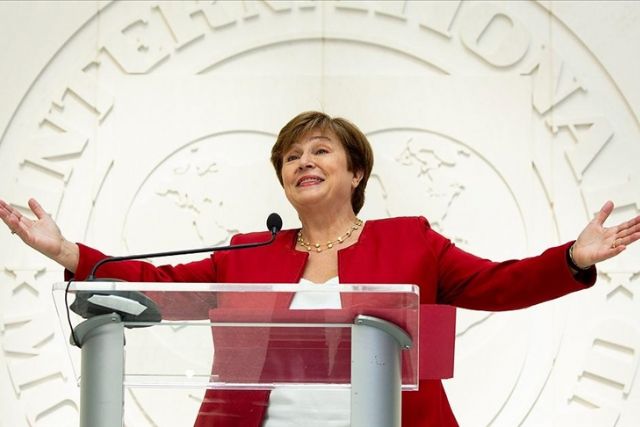At Davos, IMF chief calls for fight against geo-economic defragmentation
Kristalina Georgieva proposes 'public digital platform' to lower costs of cross-border money transfers

ANKARA
On the first day of Davos, the head of the IMF said on Monday that the global economy is facing what could be its biggest test since World War II, calling for a fight against geo-economic defragmentation.
As the Russia-Ukraine war rages on, trust in the global economic system has been on the decline amid rising tensions over trade, technology standards, and security, Kristalina Georgieva told participants in the World Economic Forum.
In her address, Georgieva argued that the possible formation of a "public digital platform" to make it less costly to transfer money between borders would strengthen trade and enhance resilience.
"We can start now by lowering trade barriers to alleviate shortages and lower the prices of food and other products," she said, adding that not only countries but also companies needed to diversify imports -- to secure supply chains and preserve the tremendous benefits of global integration.
"While geostrategic considerations will drive some sourcing decisions, this need not lead to disintegration. Business leaders have an important role to play in this regard," she noted.
Referring a recent IMF study, she said diversification could cut potential GDP losses from supply disruptions in half. "Auto manufacturers and others have found that designing products that can use substitutable or more widely available parts can reduce losses by 80%."
Diversifying exports can also level up economic resilience, she said, while other policies that can help include enhancing infrastructure to help shorten supply chains, increasing broadband Internet access, and improving the business environment.
Stepping up efforts to handle debt
Georgieva said nearly 60% of low-income countries with significant debt vulnerabilities would need debt restructuring. "Without decisive cooperation to ease their burdens, both they and their creditors will be worse off. But a return to debt sustainability will draw new investment and spur inclusive growth."
That is why the G20 common framework for debt treatment must be improved without delay, she underlined.
She also said modernizing cross-border payments would be vital, noting that inefficient payment systems were another barrier to inclusive growth.
"Take remittances: The average cost of an international transfer is 6.3%, meaning some $45 billion per year are diverted into the hands of intermediaries -- and away from millions of lower-income households," she explained.
Countries can work together to develop a global public digital platform so all can send money at minimal cost and maximum speed and safety, she added.
Georgieva also pointed out the importance of tackling climate change globally. "We urgently need to close the gap between ambition and policy. To accelerate the green transition, the IMF has argued for a comprehensive approach that combines carbon pricing and investment in renewables, and compensation for those adversely affected."





